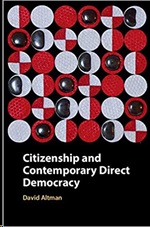
272 pages
ISBN-13: 978-1108496636
Publisher: Cambridge University Press, 2018)
Available in Amazon
Standing out from all other books on direct democracy, Citizenship and Contemporary Direct Democracy connects the study of direct democracy to the broader field of comparative democratization and to an important strand in normative democratic theory. Analyzing the relationship between direct democracy and representative government, this book is organized around three main sections: the origins of contemporary direct democracy, its functioning, and the ways to improve the use of direct democracy and its abuse. David Altman argues that citizen-initiated mechanisms of direct democracy constitute an important and viable way to re-invigorate current representative regimes by strengthening democracies' normative foundations - freedom and equity among citizens - which are particularly fragile in the context of unequal societies. Citizenship and Contemporary Direct Democracy demonstrates how citizen-initiated mechanisms of direct democracy empowers citizens, channels social demands, defuses violence, re-enchants citizens with politics, and breaks through some of the institutionalized barriers to accountability that arise in representative systems.
Editorial Reviews:
'Citizenship and Contemporary Direct Democracy offers a comprehensive and rigorous analysis of the origins and effects of popular initiatives, referenda, and other forms of direct democracy. Altman makes a compelling case, and shows that the impact of popular initiatives extends well beyond the often attention-grabbing election outcomes. Those of us who care about the fate of liberal democracy should pay close attention.' Steven Levitsky, Harvard University, Massachusetts
'Switzerland is where direct democracy got started, and California may be the global capital of direct democracy. But the foremost global scholar of direct democracy is a Uruguayan political scientist based in Chile. David Altman is not a name that many in California’s ballot measure industry know, but that should change. And his new book, Citizenship and Contemporary Direct Democracy, should be read by all of the people that Joel Fox calls “initiative warriors.” Altman’s book is academic, but it’s also very clear. And it’s short while being comprehensive—laying out what we know about direct democracy, and what we don’t know. But what is most important about Altman is the way he combines a big global picture of direct democracy, which is being used more and more around the world, with its particulars. To get direct democracy right, he shows, means to use it in context and in conjunction with representative democracy, so that democracy in its direct and representative forms is better.' Joe Mathews, Connecting California Columnist and Editor, Zócalo Public Square, Fellow at the Center for Social Cohesion at Arizona State University
'David Altman's new book on direct democracy blends theoretical insights with descriptive facility, presenting a thorough analysis of the remedial properties and potentials of direct democratic institutions within the institutional framework of representative democracy. I cannot think of another scholar as well qualified as David Altman to write a book of this kind, and I cannot recommend it highly enough.' Adrian Vatter, Chair of Swiss Politics, Institute of Political Science, University of Bern
Comments powered by CComment